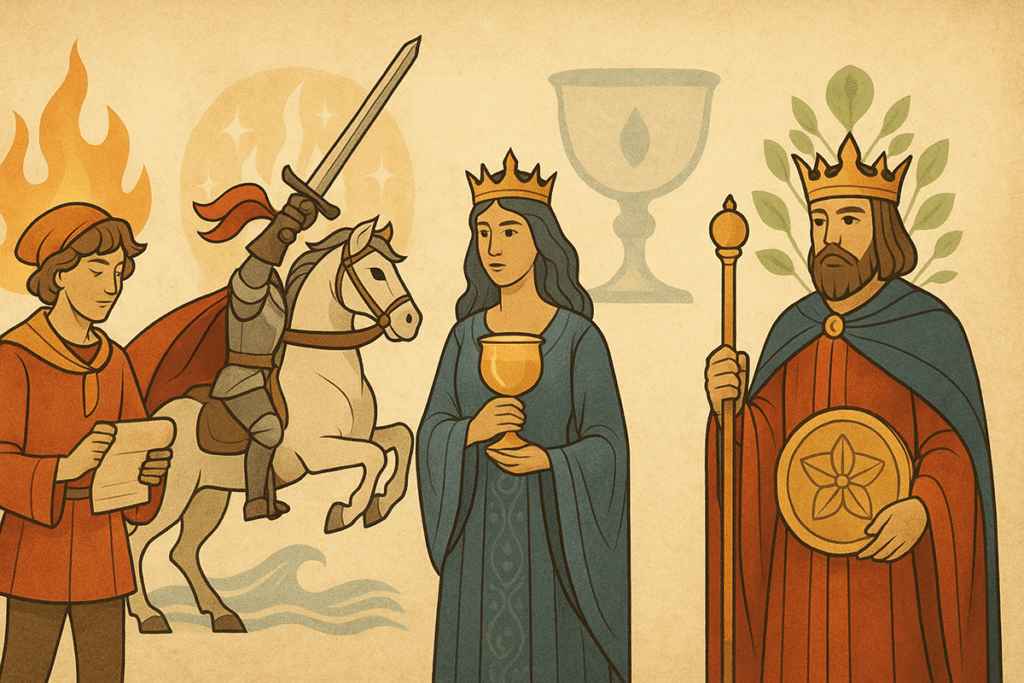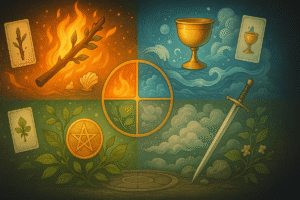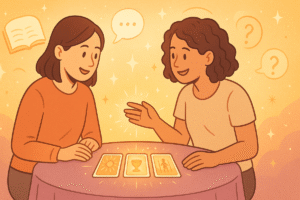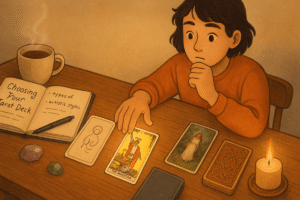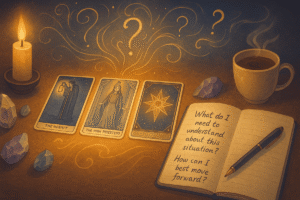Table of Contents
When I first started reading tarot, the court cards honestly confused me more than any other part of the deck. While the Major Arcana told clear stories and the numbered cards had straightforward energy patterns, these sixteen figures seemed to stare back at me with mysterious expressions. What exactly were they supposed to represent?
Perhaps you’ve felt this same uncertainty when encountering the Pages, Knights, Queens, and Kings in your readings. These cards often leave beginners scratching their heads, wondering if they’re meant to represent actual people or something else entirely. The truth is, court cards are some of the most versatile and psychologically rich cards in the entire tarot deck.
Understanding the Nature of Court Cards
Court cards operate differently from other tarot cards because they represent dynamic human qualities rather than static situations or events. Think of them as mirrors reflecting different aspects of personality, maturity levels, and approaches to life’s challenges.
Each court card embodies a specific combination of elemental energy and developmental stage. The four suits (Cups, Wands, Pentacles, and Swords) provide the elemental foundation, while the four court positions (Page, Knight, Queen, King) represent different levels of mastery and expression within that element.
What makes court cards particularly fascinating is their flexibility in interpretation. Sometimes they might represent actual people in your life who embody these qualities. Other times, they could be highlighting aspects of your own personality that are currently active or need development. I find that the most meaningful readings often occur when we consider court cards as internal guidance rather than external predictions.
The Pages as Curious Students
Pages represent the beginning stages of learning and exploration within each suit’s domain. These cards embody childlike wonder, enthusiasm for new experiences, and the willingness to make mistakes while learning. When Pages appear in your readings, they often invite you to examine your relationship with curiosity and beginner’s mind.
The Page of Cups might encourage you to explore your emotional landscape with fresh eyes. What feelings have you been dismissing or avoiding? This card suggests approaching your inner emotional world with the same openness a child might show when discovering a hidden garden.
The Page of Wands carries the spark of creative inspiration and new ventures. When this energy appears, you might ask yourself what projects or passions have been calling to your attention. The Page of Wands doesn’t guarantee success, but rather points toward the importance of taking that first enthusiastic step.
Pages of Pentacles often appear when we’re being called to learn practical skills or develop a more grounded approach to our material world. Perhaps there’s a new area of knowledge that could benefit your career or daily life. This card asks you to consider where patient, methodical learning might serve you.
The Page of Swords represents intellectual curiosity and the desire to understand complex ideas. This energy might manifest as a pull toward research, writing, or engaging in meaningful conversations that challenge your current perspectives.
I notice that Pages often appear during transitional periods when we’re ready to embark on new learning journeys. They remind us that expertise begins with a willingness to be a beginner.
Knights as Passionate Action Takers
Knights represent the adolescent stage of development within each suit, characterized by intense energy, strong convictions, and sometimes impulsive action. These cards often appear when we’re being called to move beyond the learning phase and into active engagement with our goals and values.
The Knight of Cups embodies emotional intensity and romantic idealism. This card might prompt you to reflect on how you express your deepest feelings. Are you honoring your emotional truth, or are you holding back out of fear? The Knight of Cups energy suggests that passionate expression, while sometimes overwhelming, often leads to authentic connections.
The Knight of Wands carries fierce determination and the courage to pursue ambitious goals. When this energy surfaces in readings, it might be highlighting your relationship with personal drive and initiative. What dreams have you been approaching too cautiously? This knight energy asks whether bold action might be more appropriate than careful planning.
Knights of Pentacles represent steady, methodical progress toward material goals. Unlike the other knights, this figure moves slowly but with incredible persistence. You might consider whether your current approach to work or financial matters needs more consistency and less dramatic gestures.
The Knight of Swords embodies intellectual passion and the drive to champion ideas or causes. This energy can be both inspiring and potentially destructive if not channeled wisely. The card invites reflection on how you communicate your convictions and whether your methods align with your intended outcomes.
Knights remind us that passion and conviction, while powerful motivators, benefit from some degree of self awareness and strategic thinking.
Queens as Masters of Inner Wisdom
Queens represent mature mastery of their suit’s internal aspects. These cards embody the ability to nurture, create, and influence through deep understanding rather than external force. Queen energy is receptive, intuitive, and powerfully transformative in subtle ways.
The Queen of Cups invites you to explore your relationship with emotional intelligence and intuitive knowing. How do you honor both your own feelings and those of others? This card often appears when we need to trust our emotional wisdom rather than overthinking situations that require heart-centered responses.
The Queen of Wands represents confident creative expression and the ability to inspire others through authentic enthusiasm. When this energy appears, you might ask yourself how you can share your unique gifts more fully. The Queen of Wands suggests that true leadership often comes through modeling passionate engagement rather than demanding compliance.
Queens of Pentacles embody practical wisdom and the ability to create abundance through careful attention to resources and relationships. This card might prompt reflection on how you can better nurture the people and projects that matter most to you. True prosperity often grows from generosity and sustainable practices.
The Queen of Swords represents clear thinking, honest communication, and the ability to cut through confusion with compassionate directness. This energy asks you to consider how you can speak your truth while remaining open to other perspectives. Wisdom often lies in knowing when to be gentle and when to be firm.
Queens remind us that real mastery involves the integration of knowledge, experience, and intuitive understanding.
Kings as External Authority Figures
Kings represent the fullest expression of their suit’s energy in the external world. These cards embody leadership, responsibility, and the ability to create lasting change through mature application of power and influence.
The King of Cups suggests mastery over emotional expression and the ability to create harmonious environments for others. When this energy appears, you might reflect on how you can use your emotional intelligence to support and guide others. True emotional leadership involves remaining calm and compassionate even during challenging circumstances.
The King of Wands represents visionary leadership and the ability to turn creative ideas into tangible results. This card often appears when you’re being called to step into a leadership role or to approach your goals with greater confidence and strategic thinking. The King of Wands asks how you can inspire others while maintaining your authentic creative vision.
Kings of Pentacles embody material mastery and the ability to create stable, prosperous environments. This energy might prompt you to consider how your practical skills and resources can benefit not just yourself but your broader community. True material success often involves creating value for others.
The King of Swords represents intellectual authority and the ability to make fair decisions based on clear thinking and ethical principles. When this energy surfaces, you might ask yourself how you can use your knowledge and analytical abilities to create positive change. This king reminds us that true authority comes from serving justice rather than personal gain.
Integrating Court Card Wisdom
Court cards work best when we understand them as developmental stages rather than fixed personality types. You might embody Page energy when approaching a new skill, Knight energy when pursuing a passionate goal, Queen energy when nurturing a project or relationship, and King energy when leading others or taking full responsibility for outcomes.
The beauty of court cards lies in their reminder that personal growth is not linear. We might need to return to Page energy even in areas where we’ve achieved mastery, especially when circumstances change or new challenges arise. Similarly, we might find ourselves cycling through different court energies within a single day or situation.
I find that court cards often appear in readings when we’re being invited to examine our current approach to a particular area of life. They rarely predict what will happen, but rather illuminate how we might choose to respond or what aspects of ourselves we might want to develop.
When court cards appear in your readings, try asking yourself these reflective questions: What energy does this card represent? How might this energy be helpful in my current situation? What would it look like to embody this energy more fully? Sometimes the most powerful insights come not from having the cards tell us what to do, but from using them as prompts for deeper self understanding.
The court cards ultimately remind us that we have access to a wide range of approaches and energies. By understanding these different aspects of ourselves, we can choose more consciously how to respond to life’s challenges and opportunities.
Frequently Asked Questions
How do I know if a court card represents a person or a personality trait?
This is honestly one of the trickiest aspects of working with court cards, and I think it’s something that even experienced readers continue to navigate. The simplest approach is to trust your initial reaction. If you look at a court card and immediately think of someone specific, that’s usually your intuition telling you something important. On the other hand, if no particular person comes to mind, consider what aspect of yourself or what approach to your situation the card might be highlighting. Sometimes I find it helpful to ask myself both questions: could this be someone in my life, and could this also be a quality I need to develop? The answer might be both.
Do the gender and age shown on court cards matter?
Not as much as you might think, actually. While the traditional imagery shows specific genders and ages, these are more about the energy and approach rather than literal demographics. A Queen can represent a young man just as easily as an older woman if he embodies that Queen’s particular qualities. What matters more is understanding the rank’s characteristics. Pages embody curious, learning energy regardless of who’s experiencing it. Kings represent mature authority whether that authority comes from a woman or a man. I’ve learned to focus on the energy and approach the card represents rather than getting too attached to the visual presentation.
What if I keep drawing the same court card repeatedly?
When a particular court card keeps appearing in your readings, it’s usually worth paying close attention. This repetition might be inviting you to examine your relationship with that card’s energy more deeply. Perhaps you’re being called to develop qualities you’ve been neglecting, or maybe you need to recognize how strongly you’re already embodying that approach. Sometimes a recurring court card points to a significant person whose influence you haven’t fully acknowledged. I find it helpful to journal about the card, exploring both its strengths and potential shadow aspects, and considering how they might be relevant to your current life situation.
Can court cards represent situations instead of people?
Yes, and this is one of the more sophisticated ways to work with these cards. Court cards can describe the energy or atmosphere of a situation rather than pointing to specific individuals. For example, the Knight of Wands energy might describe a fast-moving, exciting but potentially chaotic situation, while Queen of Pentacles energy might characterize a nurturing, resource-rich environment. When you’re having trouble connecting a court card to either yourself or another person, try asking what kind of energy or approach the situation itself seems to embody. This perspective can reveal insights that aren’t immediately obvious when you’re only looking for people.

